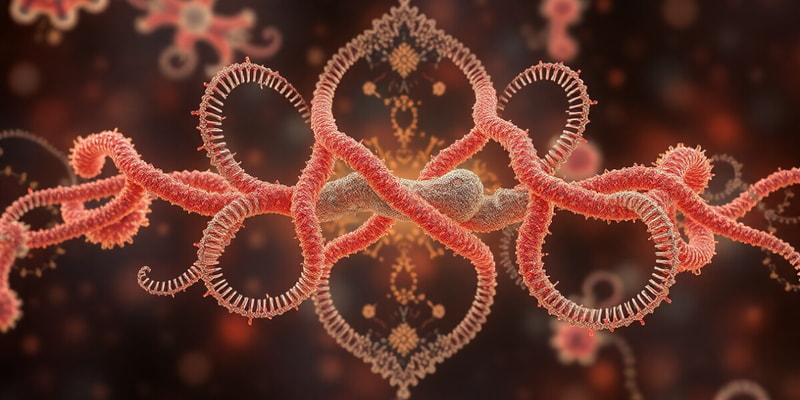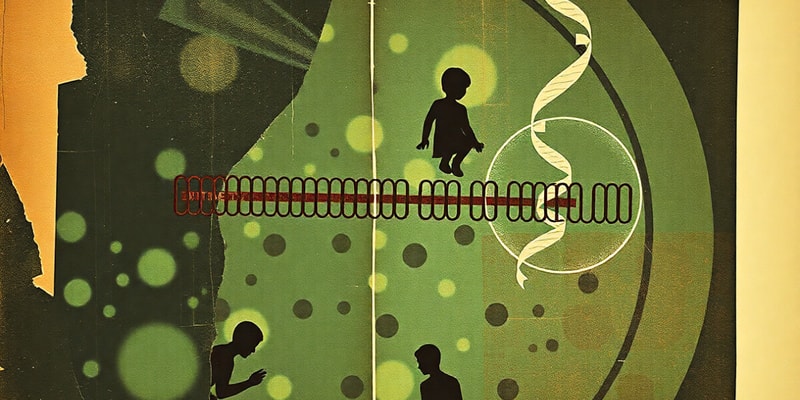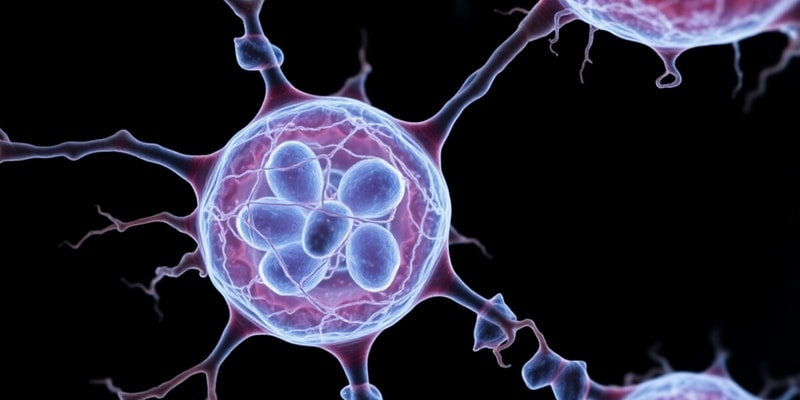Podcast
Questions and Answers
What occurs during prophase of mitosis?
What distinguishes homologous chromosomes from sister chromatids?
What is the role of the cohesin protein complex during mitosis?
What structure is responsible for organizing the microtubules during cell division?
Signup and view all the answers
Which type of spindle fiber helps provide structure during anaphase?
Signup and view all the answers
What does the term 'tubulin flux' refer to in the context of mitosis?
Signup and view all the answers
What is the role of CENPE during mitosis?
Signup and view all the answers
During which phase do chromosomes align at the metaphase plate?
Signup and view all the answers
Which motor proteins are involved in chromosome movement during mitosis?
Signup and view all the answers
What happens during telophase?
Signup and view all the answers
What happens during telophase in mitosis?
Signup and view all the answers
What is the importance of kinetochores in mitosis?
Signup and view all the answers
What occurs in prometaphase during mitosis?
Signup and view all the answers
How does cytokinesis occur in animal cells?
Signup and view all the answers
What structure forms in plant cells during mitosis to assist in cell division?
Signup and view all the answers
Which of the following statements is true regarding depolymerases in mitosis?
Signup and view all the answers
What event occurs at the metaphase stage of mitosis?
Signup and view all the answers
What is the importance of the anaphase-promoting complex (APC) in mitosis?
Signup and view all the answers
How do plant cells differ from animal cells during mitosis regarding cytokinesis?
Signup and view all the answers
What triggers the formation of the cleavage furrow during cytokinesis?
Signup and view all the answers
What role does the anaphase-promoting complex (APC) play during anaphase?
Signup and view all the answers
Which protein inhibits separase before anaphase begins?
Signup and view all the answers
During anaphase A, what is the primary movement of the chromosomes?
Signup and view all the answers
What happens if the chromosomes are not properly aligned during metaphase?
Signup and view all the answers
How do chromosomes stay connected to spindle fibers during tubulin loss?
Signup and view all the answers
What is aneuploidy?
Signup and view all the answers
Which protein is likely serving a similar function to the dam ring in vertebrates?
Signup and view all the answers
What is the effect of the degradation of securin during anaphase?
Signup and view all the answers
Which stage of mitosis is characterized by the shortening of spindle fibers for chromosome movement?
Signup and view all the answers
What is the primary function of the APC with cdh1 after mitosis?
Signup and view all the answers
Which stage of mitosis involves the disappearance of the nuclear envelope?
Signup and view all the answers
What is the primary function of cohesin during mitosis?
Signup and view all the answers
Which structure is crucial for chromosome movement during mitosis?
Signup and view all the answers
What occurs to chromatin during prophase?
Signup and view all the answers
What is the significance of tubulin flux during mitosis?
Signup and view all the answers
Which spindle fibers provide the structure necessary for chromosomes to separate during anaphase?
Signup and view all the answers
In which phase do chromosomes move to the metaphase plate?
Signup and view all the answers
What happens to sister chromatids at the end of anaphase?
Signup and view all the answers
What role does condensin play during mitosis?
Signup and view all the answers
What does the positive end of the spindle fibers attach to during mitosis?
Signup and view all the answers
What is the role of the anaphase-promoting complex (APC) in the transition from metaphase to anaphase?
Signup and view all the answers
What happens to tubulin subunits during anaphase in relation to chromosome movement?
Signup and view all the answers
What is the primary consequence of a metaphase arrest due to misaligned chromosomes?
Signup and view all the answers
How does the MAD protein contribute to cell cycle regulation during mitosis?
Signup and view all the answers
What occurs during Anaphase A in relation to chromosome movement?
Signup and view all the answers
What does separase degrade to facilitate the separation of sister chromatids during anaphase?
Signup and view all the answers
In the context of chromosomes and spindle fibers during anaphase, which statement is accurate?
Signup and view all the answers
Which component likely fulfills a function similar to the dam ring for chromosome movement in vertebrates?
Signup and view all the answers
What is the result of the degradation of securin prior to anaphase?
Signup and view all the answers
What is the primary role of motor proteins during mitosis?
Signup and view all the answers
What happens to the connection between the kinetochore and spindle fibers during tubulin loss?
Signup and view all the answers
Which stage of mitosis is directly followed by the formation of a contractile ring?
Signup and view all the answers
What happens to the chromosomes during telophase?
Signup and view all the answers
What is the function of the phragmoplast in plant cells during mitosis?
Signup and view all the answers
Which process is specifically inhibited by antibodies to actin and myosin?
Signup and view all the answers
How are tubulin subunits involved in the chromosome movement during mitosis?
Signup and view all the answers
What is the primary consequence of chromosome condensation during mitosis?
Signup and view all the answers
What structure provides the necessary organization for microtubules during cell division?
Signup and view all the answers
What role does the anaphase-promoting complex (APC) play in mitosis?
Signup and view all the answers
What cellular structure is crucial for plant cells to establish after mitosis?
Signup and view all the answers
Study Notes
M Phase
- M Phase consists of Mitosis & Cytokinesis
- Mitosis stages include:
- Prophase: Chromosome condense, nuclear envelope disappears, spindle forms
- Prometaphase: Chromosomes move to the metaphase plate
- Metaphase: Chromosomes lined up at the metaphase plate
- Anaphase: Chromosomes and poles separate
- Telophase: Opposite events of prophase occur
Homologous Chromosomes & Sister Chromatids
- Homologous Chromosomes: two copies of each chromosome found in diploid cells
- Sister Chromatids: duplicated DNA of each homologous chromosome after S phase
- Sister Chromatids form an X shape, connected by a centromere composed of two kinetochores
Chromosome Condensation & Kinetochores
- Chromosome condensation: chromatin becomes tightly packed and organized
- Cohesin: Holds sister chromatids together
- Condensin: Responsible for chromatin compaction
- Kinetochores: Distinct structures that bind factors involved in chromosome movement during mitosis
Spindle Fibers
- Spindle Fibers are made up of:
- Kinetochore fibers: Attached to chromosomes, help move chromosomes
- Polar fibers: Provide structure to slide past each other in anaphase to separate poles
- Astral fibers: Localize the spindle apparatus in the cell
- Positive end of fibers at the kinetochore, minus end at the microtubule organizing center (MTOC) at centrosome
- Microtubule nucleation can occur at the MTOC and/or at the kinetochore
Tubulin Flux
- Two types of tubulin flux:
- Constant slow addition of tubulin subunits to (+) end and slow loss at (–) end, subunits slowly move from (+) to (–) end
- Rapid flux to change the length of chromosome spindle fibers, adjusts chromosome position in prometaphase, in equilibrium in metaphase, shortens both ends in anaphase
Anaphase Promoting Complex (APC)
- APC with cdc20 promotes transition from metaphase to anaphase
- Securin inhibits separase
- Separase degrades cohesin, allowing sister chromatids to separate
- APC-cdc20 degrades securin, activating separase and degrading cohesin
- APC with cdh1 allows cells to exit mitosis and re-enter the cell cycle
Anaphase A & Anaphase B
- Anaphase A: Chromosomes move to the poles, during anaphase, chromosomal spindle fibers shorten by losing tubulin subunits from both ends
- Anaphase B: Poles separate
Chromosome Movement
- Kinetochore connection to chromosomes is indirect
- Yeast: Dam ring extends from kinetochore at plus end surrounding and near plus end of fiber, allowing plus end to lose/gain tubulin subunits
- Loss of tubulin subunits helps the sliding of the ring to the minus end, bringing the chromosomes with it
- Vertebrates: Similar function likely fulfilled by NDC80 or CENP-E
Checkpoints
- Metaphase arrest prevents aneuploidy (abnormal number of chromosomes)
- MAD protein is recruited to misaligned chromosomes and prevents APC from degrading securin, stopping progression into anaphase until proper alignment
Chromosome Movement During Mitosis
- Chromosome movement during mitosis is a combination of tubulin flux, motor proteins, and depolymerases
- CENPE: Important for plus-end elongation
- Dynein & chromokinesin: Motors
- Depolymerases: Required to remove tubulin subunits
Telophase & Cytokinesis
- Telophase: Opposite of prophase, nuclear envelope reforms, chromosomes decondense, and spindle disappears
- Cytokinesis: Actin & myosin fibers form a contractile ring, forming a cleavage furrow between future daughter cells, pinches off to split parental cell, inhibited by antibodies to actin/myosin
Plant Cell Mitosis
- Plant cells form a cell wall after mitosis
- Phragmoplast: Array of microtubules forms where spindle was
- Golgi-derived vesicles migrate to the border between future cells
- Membrane of vesicles becomes a new cell membrane, content becomes new cell wall
Fundamental Points
- Each step in metaphase is defined by specific events
- After S phase and before mitosis, each homologous chromosome consists of two sister chromatids
- Mitosis separates the chromatids into daughter cells
- Chromosome condensation and tubulin flux are important events in mitosis
- APC with various cofactors is critical in the progression through and out of mitosis
- Cytokinesis depends on actin and myosin
- Plant cell mitosis ends with the formation of a new cell wall involving the phragmoplast
Mitosis and Cytokinesis
- M phase consists of mitosis and cytokinesis.
-
Mitosis stages:
- Prophase: chromosomes condense, nuclear envelope disappears, spindle forms.
- Prometaphase: chromosomes move to the metaphase plate.
- Metaphase: chromosomes lined up at the metaphase plate.
- Anaphase: chromosomes and poles separate.
- Telophase: opposite events of prophase occur.
Homologous Chromosomes and Sister Chromatids
- Homologous chromosomes: two copies of each chromosome in diploid cells.
- Sister chromatids: duplicated DNA of every single homologous chromosome after the S phase.
- Centromere connects sister chromatids, composed of two kinetochores which are attachment points for microtubules.
Chromosome Condensation and Kinetochores
-
Chromosome Condensation: Chromatin is organized into tightly packed sections, facilitated by cohesin and condensin.
- Cohesin: keeps sister chromatids together.
- Condensin: responsible for chromatin compaction.
- Kinetochores: have distinct structures that bind to factors important for chromosome movement in mitosis.
Spindle Fibers
- Kinetochore fibers: attached to chromosomes and help move them.
- Polar fibers: provide structure to the spindle and allow the poles to slide past each other in anaphase.
- Astral fibers: localize the spindle apparatus in the cell.
- Positive end: of the fibers is at the kinetochore.
- Minus end: is at the microtubule organizing center (MTOC) at the centrosome.
- Microtubule nucleation can occur at the MTOC and/or the kinetochore.
Tubulin Flux
- Constant slow addition of tubulin subunits: to the (+) end and slow loss at the (–) end.
- Subunits slowly move: from the (+) to the (–) end.
- Rapid flux to change the length of chromosome spindle fibers: adjusts chromosome position in prometaphase, reaches equilibrium in metaphase, and shortens both ends in anaphase.
- These changes in fiber length allow for chromosome movement.
Metaphase to Anaphase Transition
- Anaphase Promoting Complex (APC) with cdc20: promotes the metaphase to anaphase transition.
- Securin: normally inhibits separase.
- Separase: degrades cohesin, allowing sister chromatids to separate.
- APC-cdc20 complex degrades securin: activating separase, degrading cohesin, and separating chromatids.
- APC with cdh1: allows cells to exit mitosis and re-enter the cell cycle, proceeding to G1.
Anaphase A and B
- Anaphase A: chromosomes move to the poles.
- Anaphase B: the poles separate.
- Chromosomes move to the poles: as chromosomal spindle fibers shorten by losing tubulin subunits from both the (+) and (–) ends.
Chromosome Spindle Fiber Shortening
- Connection between the kinetochore and chromosomes: indirect.
- Dam ring (in yeast): extends from the kinetochore at the plus end, going around and near the plus end of the fiber, leaving the plus end free to lose/gain tubulin subunits.
- Tubulin subunit loss: exerts force that slides the ring to the minus end, bringing the chromosomes with it (toward the pole).
- Vertebrates: similar mechanism likely fulfilled by another factor (NDC80 or CENP-E).
Checkpoints
- Metaphase arrest: prevents daughter cells from receiving the wrong number of chromosomes (aneuploidy).
- MAD protein: recruited to misaligned chromosomes (due to misaligned forces pulling in different directions).
- MAD protein prevents APC from degrading securin: stopping progression into anaphase until chromosomes properly align.
Chromosome Movement Mechanisms
- Chromosome movement during mitosis: combination of tubulin flux, motor proteins, and depolymerases.
- CENPE: important for plus-end elongation.
- Dynein and chromokinesin: motor proteins.
- Depolymerases: remove tubulin subunits.
Telophase and Cytokinesis
- Telophase: opposite of prophase, nuclear envelope reforms, chromosomes decondense, spindle disappears.
- Cytokinesis: actin and myosin fibers form a contractile ring.
- Cleavage furrow: forms between the two future daughter cells.
- Furrow eventually pinches off: splitting the parental cell into two daughter cells.
- Antibodies to actin or myosin inhibit this process.
Plant Cell Cytokinesis
- Plant cells form a cell wall after mitosis.
- Phragmoplast: array of microtubules forms where the spindle was.
- Vesicles (from Golgi): migrate to the border between the future cells.
- Vesicle membrane: becomes a new cell membrane.
- Vesicle content: gives rise to the new cell wall.
Fundamental Points
- Metaphase occurs in defined steps: each with specific events.
- After S-phase and before mitosis: each homologous chromosome consists of two sister chromatids.
- Mitosis separates the chromatids: into the daughter cells.
- Chromosome condensation and tubulin flux are important events in mitosis.
- Anaphase-promoting complex (APC): critical for progression through and out of mitosis.
- Cytokinesis depends on actin and myosin.
- Plant cell mitosis ends with the formation of a new cell wall: involving the phragmoplast structure.
Studying That Suits You
Use AI to generate personalized quizzes and flashcards to suit your learning preferences.
Related Documents
Description
This quiz covers the M Phase of the cell cycle, focusing on the processes of mitosis and cytokinesis. It includes details on the stages of mitosis, homologous chromosomes, sister chromatids, chromosome condensation, and kinetochores. Test your understanding of these critical concepts in cell division.




